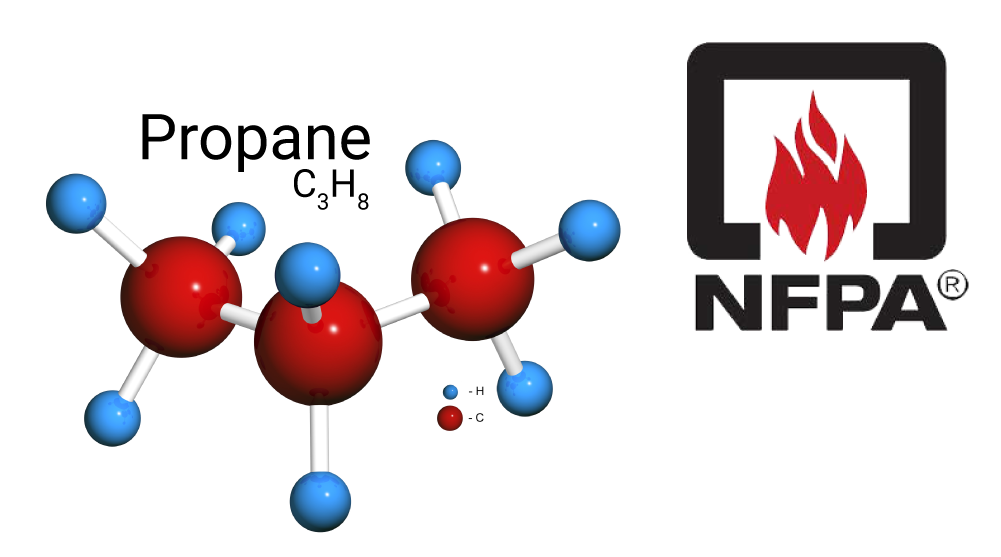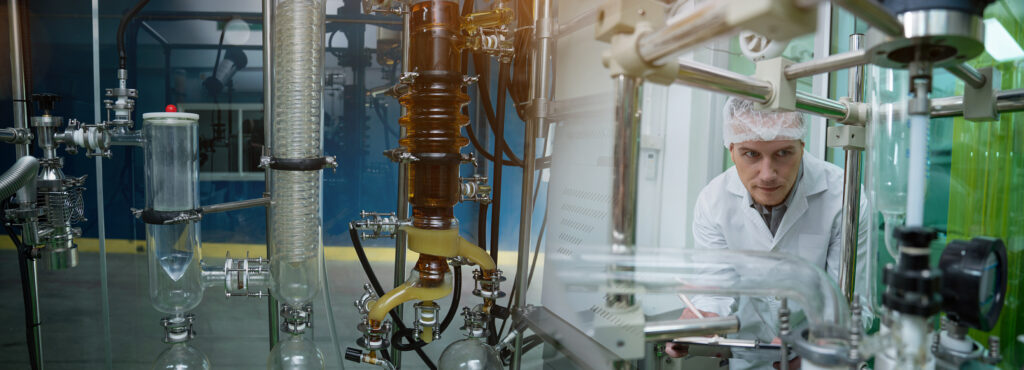Fire Codes/Laws
Michigan marijuana grow and processing facilities require a license to operate from the Michigan Cannabis Regulatory Agency (CRA).
To hold a license, you first need to pass a number of on-site inspections including a building code inspection and fire code safety inspection.
Inspections are done through the Bureau of Fire Services.

The CRA sets the regulations for safe marijuana operations and BFS enforces compliance. Building codes and fire codes must be followed including the requirements for using different extraction solvents (Butane, CO2) including propane. If an operation chooses to use propane, they must follow NFPA 58 Liquefied Petroleum Gas Code.

Propane is regulated by the National Fire Protection Agency, specifically NFPA 58.
Michigan’s propane industry follows NFPA 58 and works closely with the Bureau of Fire Services.
The CRA Inspection Checklists help to prepare for an on-site inspection. They
are to be used as a general guide.
A state fire official including fire marshal inspects a facility using:
NFPA 1, 2018, “Fire Code” and
NFPA 58, “Liquified Petroleum Gas Code.”
Below are additional regulations regarding closed loop systems when using propane.
NFPA 1, 2018, “Fire Code” – order from MRA or NFPA here
R 420.202 Adoption by reference.
Rule 2. (1) The following codes, standards, or regulations of nationally recognized organizations
or associations are adopted by reference in these rules:
(a) National fire protection association (NFPA) standard 1, 2018 edition, entitled “Fire Code” is
adopted by reference as part of these rules. Copies of the adopted provisions are available for inspection and distribution from the National Fire Protection Association, 1 Batterymarch Park, P.O. Box 9101, Quincy, Massachusetts, 02169, telephone number 1-800-344-3555, for the price of $106.00.
(b) National fire protection association (NFPA) standard 58, 2020 edition, entitled “Liquified Petroleum Gas Code” is adopted by reference as part of these rules. Copies of the adopted provisions are available for inspection and distribution from the National Fire Protection Association, 1 Batterymarch Park, P.O. Box 9101, Quincy, Massachusetts, 02169, telephone number 1-800-344-3555, for the price of $70.50.
(2) The standards adopted in subrule (1) of this rule are available for inspection and distribution at the agency, located at 2407 North Grand River Avenue, Lansing, MI, 48906. Copies of these standards may be obtained from the agency at the cost indicated in subrule (1)(a) and (b) of this rule, plus shipping and handling.
NFPA 1, 2018, Chapter 38, Marijuana Growing, Processing or Extraction Facilities
NFPA 1, 38.6.2 Liquefied Petroleum Gas (LPG) Extraction
- Compliance with 38.6.1 and 38.6.2
- Exhaust Systems
- NFPA 91 Standard for Exhaust Systems for Air Conveying of Vapors, Gases, Mists, and Particulate Solids or mechanical code
- Electrical
- NFPA 70 NEC
- Lighting and equipment interlocked with exhaust system
- E-power: lighting, ventilation system, solvent gas detection
- NFPA 70 NEC
- Gas Detection < or + to 25% LEL/LFL
- Protection
- Automatic Suppression: NFPA 12, 13, 17 and 2001
- Piping
- NFPA 58 LP Gas Code
NFPA 1, 38.6.3 Flammable and Combustible Liquid Extraction
- Compliance with 38.6.1 & 38.6.3
- Exhaust Systems
- NFPA 45, NFPA 91 Standard for Exhaust Systems for Air Conveying of Vapors, Gases, Mists, and Particulate Solids or mechanical code
- Electrical
- NFPA 70 NEC
- Lighting & equipment interlocks with exhaust system
- Storage, Use & Handling
- NFPA 1 & Chapter 66 Flammable & Combustible Liquids (NFPA 30)
- Heating of flammable/combustible liquids over open flame is prohibited
NFPA 1, 38.6.7 Transfilling
- Addresses working container connected to extraction equipment
- Comply with:
- Section 69.3.5 Container Separation Distances [58, 6.4]
- Section 69.4.2 Operational Safety [58, 7.2]
- NFPA 58 LP-Gas Code
Chapter 39
C1D1 Closed Looped Booth NFPA 70 National Electrical Code click here
Liquid Petroleum Gas (Propane) Extraction: Source BFS
- LPG containers SHALL NOT be stored in extraction room
Transfilling shall take place outside of extraction room
Extraction Solvent must be identified e.g. LPG
Shall have an automatic emergency power system installed
- Used plant material must be allowed to off gas in booth/hood
- Compressed Cylinders must be secured from tipping and not be stored in the extraction room area
- Flammable and Combustible Liquid shall be stored in an approved flammable liquid storage cabinet
- LPG extraction must be done in closed loop extraction machine system
- Extraction machine has to be in Classified 1, Division 1 (C1,D1) booth or lab hood
- Booth or hood shall have interlocking features
- Shall have gas monitoring set to 25%LEL/LFL
- Shall have automatic suppression system in booth / hood along with duct work
- Heating of flammable or combustible liquids over open flame is prohibited
BFS / Cannabis Facilities Code Spotlight - Propane

Michigan Propane
Propane is non-toxic. It doesn’t contaiminate air, soil or groundwater (EPA). Thousands of Michigan homes and businesses run on propane.
Propane is a low-emissions, low-cost fuel used by a variety of public and private fleets. There’s over 33,000 propane vehicles running on Michigan roads.
Propane is easy to use with minimal mess, making outdoor grilling fun. Try the delicious, seasonal recipes featuring Michigan grown produce.
Propane is easy to use with minimal mess, making outdoor grilling fun. Try the delicious, seasonal recipes featuring Michigan grown produce.
The Michigan Propane Commission offers a propane water heater or boiler rebate to rural residents and licensed installers.

